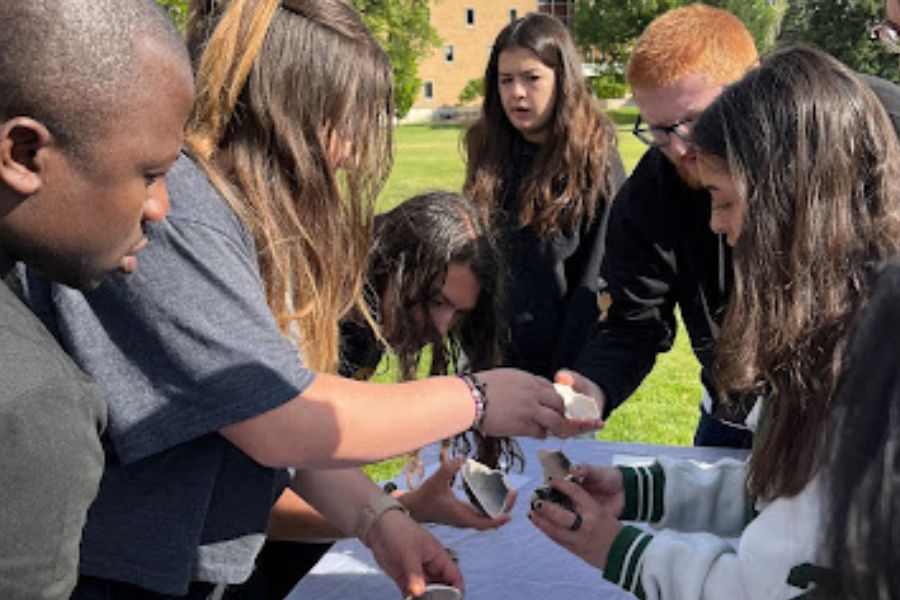Bengal Bridge Program Enhances College Transition through Interactive Anthropology Course

Bengal Bridge students in Discover Anthropology practice reconstructing pottery shards.
Elisabeth Curtis
July 18, 2023
Idaho State University's Bengal Bridge program is paving the way for a helpful transition from high school to college life for incoming freshmen. One course that is helping students prepare for their fall semester is ANTH 1100 Discover Anthropology.
Like other Bengal Bridge courses, ANTH 1100 not only provides academic credit, but also equips students with essential skills for success in higher education.
Dr. Liz Redd, Assistant Professor and Director of American Indian Studies in the Department of Anthropology expresses her excitement about teaching the Bengal Bridge summer course. “I have been excited to teach the Bengal Bridge summer course twice now and really enjoy working with the incoming freshmen,” she says. “They are often excited to be at ISU and it is always fun to learn from them, too. I love teaching!”
Discover Anthropology focuses on academic integrity, source citation, evidence-based argumentation, time management, and teamwork. Moreover, students embark on an immersive journey into the world of anthropology, exploring its four subfields: Biological Anthropology, Archaeology, Cultural Anthropology, and Linguistic Anthropology.
ISU freshman, Alondra Diaz Ponciano says, “I decided to take anthropology because I believe that it is important to know where we originated from and to understand the importance of cultures.”
Freshman Eric Nickell-Wood, who wants to go into psychology, says he chose this class to see if he was interested in anthropology. The Bengal Bridge program and the anthropology course have been helpful to prepare him for the fall semester, know where his classes are, and get a sense of what he will be doing. “I’m testing the waters to see if what I want to actually go into is best for me,” he says.
The course engages students through a wide range of interactive activities that foster learning and critical thinking. For instance, students participated in a color sorting game, categorizing color swatches based on language-specific terms to appreciate cultural variations in color perception.
Discover Anthropology also incorporates an online evolution game that allows students to explore the fascinating topic of evolution in an interactive format. Students compare quadripedal and bipedal locomotion, engage in skull identification exercises, and participate in a living kinship chart activity that simulates kinship and marriage dynamics within clans.
Clairece Mowat, a freshman who has not yet declared a major, finds value in learning about cultures and history. She appreciates the interactive elements of the ANTH 1100 course, which have enhanced her educational experience.
Looking ahead, students will engage in exciting activities, including an ISU campus language scavenger hunt, a walking tour of ISU landmarks, a guest lecture by a Shoshone-Bannock elder, and a murder mystery game that integrates all four subfields of anthropology.
One of the course's recent activities involved engaging outdoor stations. Students gained unique insights with hands-on experiences at each station. Undergraduate student James Kickham, who has taken the anthropology course 'Making Stone Tools,' led the first station, teaching students about Paleolithic stone tools and demonstrating tool-making techniques.
The second station focused on prehistoric weapons, highlighting the advantages of ranged weapons such as the atlatl and bow and arrow. Led by instructor Dr. Elizabeth Redd, the session allowed students to practice using the atlatl and compare the distance achieved with hand-held darts versus those propelled using the atlatl. This experience deepened students' understanding of the significance of such weapons for hunters.
At the third station, students delved into pottery analysis, refining their skills in identifying characteristics to determine pottery manufacturing techniques. They also had the opportunity to piece together pottery sherds, honing their analytical abilities.
Alondra Diaz Ponciano expresses her preference for the engaging elements of the course. As a visual learner, she finds that active participation provides her with more opportunities to engage and learn.
“Bengal Bridge is helpful to me,” Alondra says, “because it doesn't just inspire me to expand my education. It motivates me to keep on experiencing and learning about different majors and subjects.”
Clairece also says that the Bengal Bridge program has been beneficial to her.
“It has been helpful because I will feel a lot more confident going into the fall semester,” Clairece says. “I have been able to get a general idea of how my classes will go and what I will be expected of by my instructors. Bengal Bridge has been an overall great experience.”
